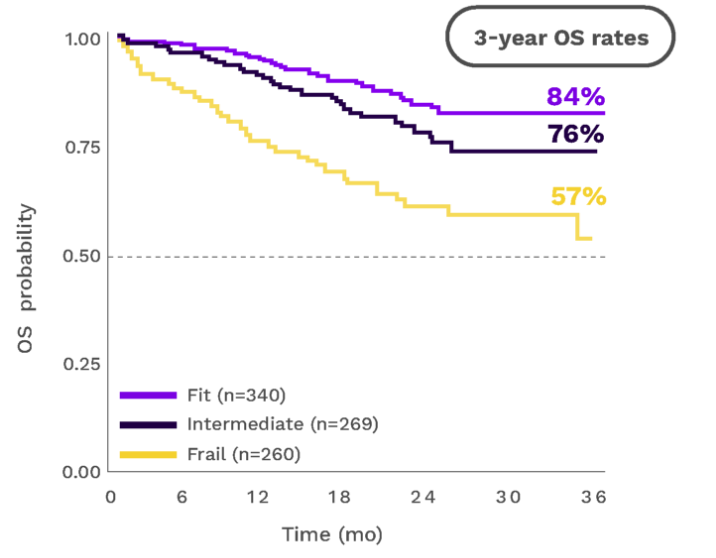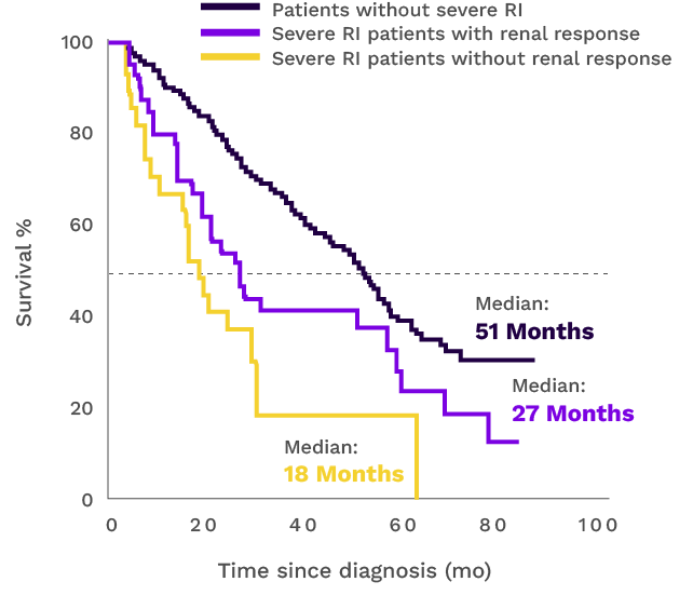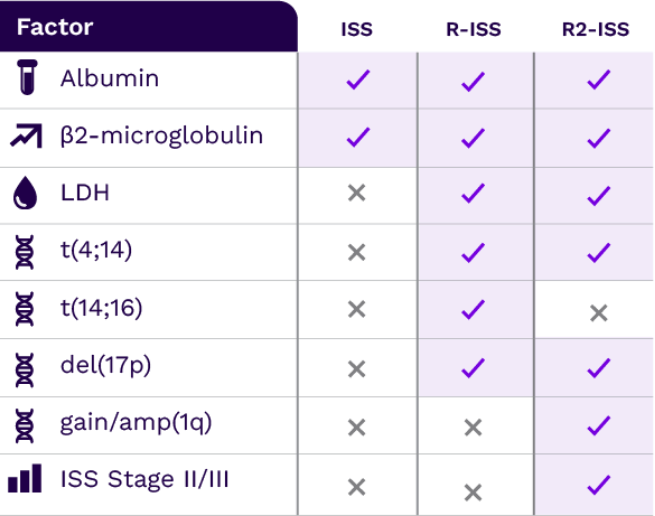Frailty assessment in clinical practice may help improve outcomes for elderly myeloma patients4
Because myeloma predominantly affects older adults, age-related treatment challenges are common.1,5
Frailty assessment is predictive of survival and toxicity and shows heterogeneity of biological age among elderly patients4
OS by IMWG frailty score4

A study of elderly patients with NDMM (N=869; median age 74 years) conducted by the IMWG to develop a frailty scoring system predictive of treatment outcomes and toxicity found that4:
- Less than one-third of patients were designated frail (30%), more than one-third were designated fit (39%), and roughly one-third were designated intermediate-fit (31%)
- Cumulative incidence of haematologic and non-haematologic adverse events, and treatment discontinuations, increased with increasing frailty
The IMWG recommends frailty assessment to inform treatment choice and to balance toxicity with survival and quality of life4,6
See evidence that suggests frailty may have greater prognostic importance than age alone
EXPLORE RECENT FINDINGS
Reversal of renal impairment through antimyeloma therapy can help improve prognosis2,7
- Renal impairment (RI) affects up to 50% of patients at diagnosis; an additional ~25% of patients will develop RI with more advanced disease2,8
- While patients with RI have shorter OS vs those without RI, these reduced outcomes can be improved by the recovery of renal function through antimyeloma therapy2,7
Patients with RI who achieve complete renal response have improved survival7
OS by renal function at diagnosis and response to treatment in patients with NDMM7

Renal response is a critical therapeutic goal in myeloma as recovery of renal function has been linked to improved OS2,8
Explore more recent findings in myeloma research
EXPLORE RECENT FINDINGS
The refinement of risk stratification of patients with high-risk cytogenetics continues to evolve with ongoing research3
- Many patients present with high-risk cytogenetic abnormalities (HRCAs) at diagnosis due to the genetic variability and chromosomal instability characteristic of myeloma3
- Clonal evolution over the course of disease can lead to the acquisition of additional HRCAs over time, which can contribute to more aggressive disease3,9
- As HRCAs are consistently associated with poor outcomes, their incorporation into staging systems is critical for improved risk stratification3,10
Revisions of the International Staging System (ISS) reflect the relevance of HRCAs in classifying disease stage10
The ISS was developed to assess patient risk to aid in accurately determining prognosis. Incorporating HRCAs into the ISS in the first and second revisions (R-ISS, R2-ISS) results in a more accurate risk assessment and can improve prognosis and the prediction of clinical outcomes.10
INCLUSION OF HRCAs IN STAGING SYSTEMS10

Increased refinement of risk stratification by disease burden and disease biology may lead to more individualised treatment approaches in the future.3,10
See why achieving MRD negativity could mitigate the poor prognosis associated with high-risk cytogenetics
EXPLORE RECENT FINDINGS
HRCA=high-risk cytogenetic abnormality; IMWG=International Myeloma Working Group; ISS=International Staging System; LDH=lactate dehydrogenase; NDMM=newly diagnosed multiple myeloma; OS=overall survival; RI=renal impairment; R-ISS=Revised International Staging System; R2-ISS=second revision of the International Staging System.
REFERENCES: 1. Miller HL, Sharpley FA. Frail multiple myeloma patients deserve more than just a score. Hematol Rep. 2023;15(1):151-156. 2. Dimopoulos MA, Sonneveld P, Leung N, et al. International Myeloma Work Group recommendations for the diagnosis and management of myeloma-related renal impairment. J Clin Oncol. 2016;34(13):1544-1557. 3. Kumar SK, Rajkumar SV. The multiple myelomas - current concepts in cytogenetic classification and therapy. Nat Rev Clin Oncol. 2018;15(7):409-421. 4. Palumbo A, Bringhen S, Mateos MV, et al. Geriatric assessment predicts survival and toxicities in elderly myeloma patients: an International Myeloma Working Group report. Blood. 2015;125(13):2068-2074. 5. Grant SJ, Freeman CL, Rosko AE. Treatment of older adult or frail patients with multiple myeloma. Hematol Am Soc Hematol Educ Program. 2021;2021(1):46-54. 6. Moller MD, Gengenbach L, Graziani G, et al. Geriatric assessments and frailty scores in multiple myeloma patients: a needed tool for individualized treatment? Curr Opin Oncol. 2021;33(6):648-657. 7. Chen X, Luo X, Zu Y, et al. Severe renal impairment as an adverse prognostic factor for survival in newly diagnosed multiple myeloma patients. J Clin Lab Anal. 2020;34(9):e23416. doi:10.1002/jcla.23416 8. Dimopoulos MA, Mikhael J, Terpos E, et al. An overview of treatment options for patients with relapsed/refractory multiple myeloma and renal impairment. Ther Adv Hematol. 2022;13:20406207221088458. doi:10.1177/20406207221088458 9. Prideaux SM, O’Brien EC, Chevassut TJ. The genetic architecture of multiple myeloma. Adv Hematol. 2014;2014:864058. doi: 10.1155/2014/864058 10. D’Agostino M, Cairns DA, Lahuerta JJ, et al. Second revision of the International Staging System (R2–ISS) for overall survival in multiple myeloma: a European Myeloma Network (EMN) report within the HARMONY project. J Clin Oncol. 2022;40(29):3406-3418.